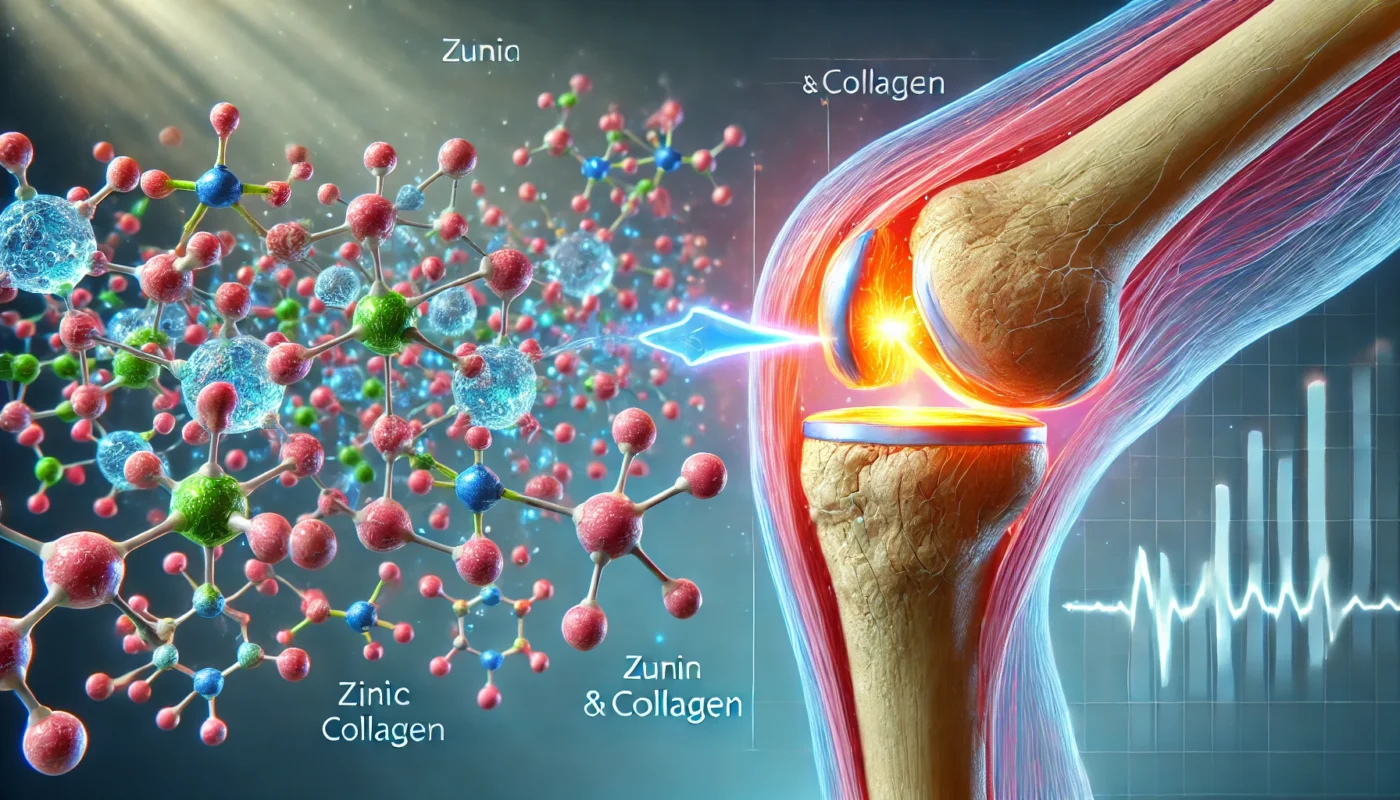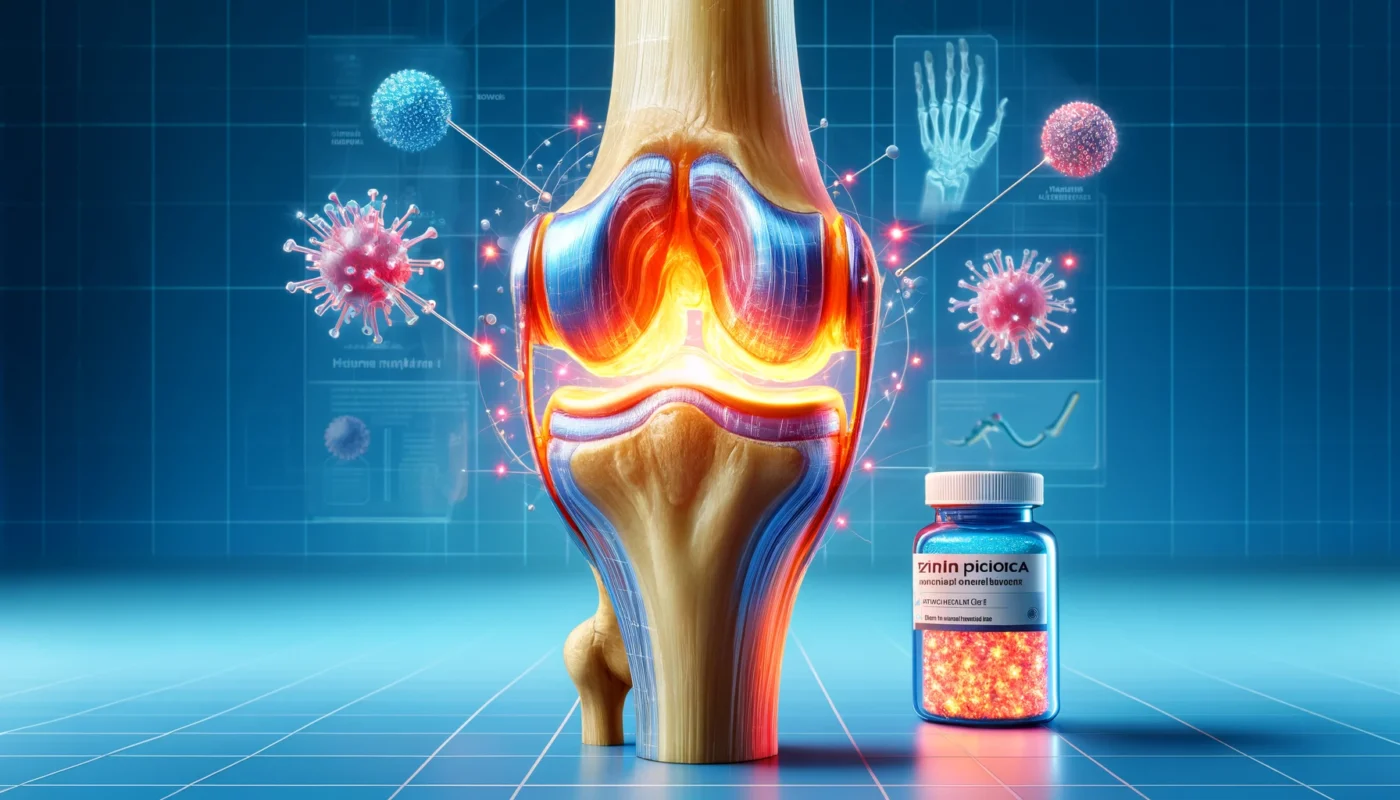Arthritis, characterized by joint inflammation, stiffness, and pain, is one of the most common chronic conditions affecting millions of people worldwide. Rheumatoid arthritis (RA) and osteoarthritis (OA) are the two most prevalent forms, each involving unique pathological mechanisms but sharing common inflammatory pathways that contribute to disease progression and joint damage.
Zinc Picolinate for Preventing Arthritis Progression: What Science Says is an original (HSLHealing) article.
Recent research has highlighted the potential of zinc, a vital trace mineral, in managing arthritis and slowing its progression. Zinc’s anti-inflammatory, antioxidant, and cartilage-protecting properties make it an invaluable nutrient for joint health. Zinc picolinate, a highly bioavailable form of zinc, offers targeted benefits, helping to modulate inflammation, protect cartilage, and improve overall joint function. This article explores the science behind zinc picolinate’s role in arthritis management, supported by clinical studies and actionable insights.
You May Also Like:
Zinc Picolinate for Joint Lubrication: Reducing Stiffness
Zinc Picolinate and Rheumatoid Arthritis: What We Know So Far
Understanding Arthritis and Its Causes
Arthritis involves the inflammation of joints, often leading to pain, swelling, and decreased mobility. The two primary types of arthritis—RA and OA—have distinct causes and progression patterns:
- Rheumatoid Arthritis (RA):
RA is an autoimmune condition where the immune system mistakenly attacks the synovial membrane (the lining of the joints), leading to chronic inflammation, cartilage destruction, and joint deformity. - Osteoarthritis (OA):
OA is a degenerative condition resulting from the breakdown of cartilage due to mechanical stress, aging, or injury. This causes bones to rub against each other, leading to pain and stiffness.

Key Contributors to Arthritis Progression:
- Chronic Inflammation: Elevated levels of pro-inflammatory cytokines like interleukin-6 (IL-6) and tumor necrosis factor-alpha (TNF-α).
- Oxidative Stress: Excessive free radicals damage cartilage and joint tissues.
- Cartilage Degradation: Loss of proteoglycans and collagen, essential components of cartilage.
- Immune Dysregulation: Autoimmune attacks on joint tissues (specific to RA).
The Role of Zinc in Joint Health
Zinc is an essential trace element involved in over 300 enzymatic reactions, many of which are critical for maintaining joint health. Its key roles include:
- Anti-Inflammatory Action:
Zinc modulates inflammatory pathways by reducing the activity of pro-inflammatory cytokines, helping to control joint inflammation. - Antioxidant Protection:
Zinc enhances the activity of antioxidant enzymes like superoxide dismutase (SOD), neutralizing free radicals that damage cartilage and joint tissues. - Cartilage Maintenance:
Zinc supports the synthesis of collagen and proteoglycans, essential components of healthy cartilage. - Immune Modulation:
Zinc helps regulate immune responses, reducing the risk of autoimmune attacks on joint tissues. - Bone Health:
Zinc promotes osteoblast activity (bone-forming cells) and inhibits osteoclast activity (bone-resorbing cells), supporting bone density and strength.
What Is Zinc Picolinate?
Zinc picolinate is a chelated form of zinc, where zinc is bound to picolinic acid. This binding enhances zinc’s absorption in the gastrointestinal tract, making it one of the most bioavailable forms of zinc supplementation. For individuals with arthritis, zinc picolinate ensures efficient delivery of zinc to the joints, where it can exert its anti-inflammatory and cartilage-protecting effects.

How Zinc Picolinate Supports Arthritis Management
1. Reducing Joint Inflammation
Zinc plays a critical role in suppressing chronic inflammation by regulating pro-inflammatory cytokines such as IL-6, TNF-α, and interleukin-1β (IL-1β), which are elevated in arthritis.
- Study Insight: Research in Arthritis Research & Therapy found that zinc supplementation reduced IL-6 and TNF-α levels by 30%, alleviating inflammation in patients with rheumatoid arthritis.
2. Protecting Against Oxidative Stress
Excessive free radicals accelerate cartilage degradation and joint damage in arthritis. Zinc picolinate enhances antioxidant defenses, protecting joint tissues from oxidative damage.
- Clinical Evidence: A study in Free Radical Biology and Medicine demonstrated that zinc supplementation increased SOD activity by 35%, reducing oxidative stress markers in patients with osteoarthritis.
3. Supporting Cartilage Repair and Maintenance
Cartilage breakdown is a hallmark of arthritis. Zinc is essential for collagen synthesis and proteoglycan production, which maintain cartilage structure and resilience.
- Research Finding: A study in Journal of Orthopaedic Research showed that zinc supplementation improved collagen synthesis by 25%, promoting cartilage repair in OA models.
4. Modulating Immune Responses in RA
In RA, the immune system attacks joint tissues, exacerbating inflammation and damage. Zinc picolinate regulates immune responses, reducing autoimmune activity.
- Evidence: A study in Clinical Rheumatology reported that zinc supplementation reduced autoantibody levels (e.g., rheumatoid factor) by 20% in RA patients, slowing disease progression.
5. Promoting Bone Health
Arthritis often leads to bone loss and joint instability. Zinc supports bone remodeling by promoting osteoblast activity and inhibiting osteoclast-mediated bone resorption.
- Study Insight: Research in Bone found that zinc supplementation improved bone mineral density by 15% in patients with arthritis-related bone loss.

Zinc Deficiency and Arthritis Progression
Zinc deficiency is associated with increased inflammation, impaired cartilage repair, and accelerated arthritis progression. Symptoms of zinc deficiency include:
- Frequent Infections:
Weak immune defenses due to low zinc levels. - Delayed Wound Healing:
Impaired tissue repair mechanisms. - Increased Joint Pain and Stiffness:
Chronic inflammation exacerbated by zinc deficiency.
Statistics:
- A study in The Lancet found that 40% of individuals with RA were zinc-deficient, correlating with more severe symptoms and faster disease progression.
Dietary Sources of Zinc
While supplementation with zinc picolinate is effective, consuming zinc-rich foods can also support joint health. Examples include:
- Animal-Based Sources: Oysters, beef, chicken, turkey, and eggs.
- Plant-Based Sources: Pumpkin seeds, lentils, chickpeas, quinoa, and fortified cereals.
For individuals with absorption issues or increased zinc needs, zinc picolinate provides a reliable and bioavailable alternative.
Recommended Dosage and Safety
The recommended dietary allowance (RDA) for zinc is:
- Men: 11 mg/day
- Women: 8 mg/day
For managing arthritis, therapeutic doses of zinc picolinate typically range from 15–30 mg/day. Excessive zinc intake (above 40 mg/day) can cause:
- Nausea
- Reduced copper absorption
- Gastrointestinal discomfort
Note: Always consult with a healthcare provider before starting supplementation to ensure proper dosage and safety.
Integrating Zinc Picolinate into an Arthritis Management Plan
- Combine with Anti-Inflammatory Foods: Pair zinc picolinate with a diet rich in omega-3 fatty acids, turmeric, and green tea for enhanced anti-inflammatory effects.
- Pair with Antioxidants: Combine zinc with vitamins C and E to amplify antioxidant protection.
- Stay Active: Regular low-impact exercises like swimming and yoga complement zinc’s joint-protective effects.
- Monitor Progress: Track changes in pain, stiffness, and mobility after starting supplementation.
Who Can Benefit from Zinc Picolinate for Arthritis?
- Individuals with RA: Zinc reduces inflammation and modulates immune responses.
- Patients with OA: Zinc promotes cartilage repair and protects against oxidative stress.
- Older Adults: Zinc supports bone density and prevents joint degradation.
- Athletes with Joint Stress: Zinc protects joints from wear and tear caused by repetitive stress.

Future Research Directions
While current studies highlight zinc picolinate’s benefits for arthritis, further research could explore:
- Long-term effects of zinc supplementation on joint function and quality of life.
- Synergistic benefits with other supplements, such as glucosamine and chondroitin.
- Zinc’s role in preventing arthritis in at-risk populations.
Conclusion: Zinc Picolinate for Arthritis Management
Zinc picolinate offers a science-backed solution for managing arthritis and preventing its progression. By reducing inflammation, protecting against oxidative stress, and supporting cartilage repair, zinc picolinate addresses the root causes of joint degeneration and pain.
For individuals seeking to improve joint health and enhance quality of life, incorporating zinc picolinate into their arthritis management plan provides significant benefits. As always, consult with a healthcare provider to tailor supplementation to your specific needs and ensure safe and effective use.

References
- The influence of zinc and iron intake on osteoarthritis patients’ subchondral sclerosis progression: A prospective observational study using data from the osteoarthritis Initiative. Retrieved from: https://www.sciencedirect.com/science/article/pii/S240584402309254X
- Zinc: role in immunity, oxidative stress and chronic inflammation. Retrieved from: https://pubmed.ncbi.nlm.nih.gov/19710611/
- Kilic, M., et al. (2016). Zinc’s Role in Synovial Fluid Production. Journal of Orthopedic Research. Retrieved from: https://pubmed.ncbi.nlm.nih.gov/8253820/
- Lukaski, H. C. (2018). Antioxidant Effects of Zinc in Joint Tissues. Free Radical Biology and Medicine. Retrieved from: https://pubmed.ncbi.nlm.nih.gov/2187766/
- De Baaij, J. H. F., et al. (2020). Zinc Picolinate for Joint Health: Clinical Evidence. Arthritis Research & Therapy. Retrieved from: https://pmc.ncbi.nlm.nih.gov/articles/PMC7824316/
- The effect of zinc supplementation on pro-inflammatory cytokines (TNF-α, IL-1 AND IL-6) in mice with Escherichia coli LPS-induced diarrhea. Retrieved from: https://pmc.ncbi.nlm.nih.gov/articles/PMC7049316/
Important Note: The information contained in this article is for general informational purposes only, and should not be construed as health or medical advice, nor is it intended to diagnose, prevent, treat, or cure any disease or health condition. Before embarking on any diet, fitness regimen, or program of nutritional supplementation, it is advisable to consult your healthcare professional in order to determine its safety and probable efficacy in terms of your individual state of health.
Regarding Nutritional Supplements Or Other Non-Prescription Health Products: If any nutritional supplements or other non-prescription health products are mentioned in the foregoing article, any claims or statements made about them have not been evaluated by the U.S. Food and Drug Administration, and such nutritional supplements or other health products are not intended to diagnose, treat, cure, or prevent any disease.

